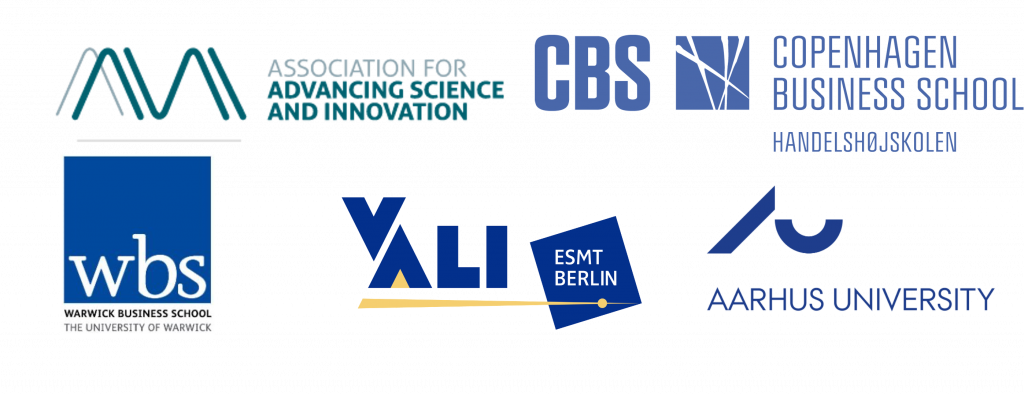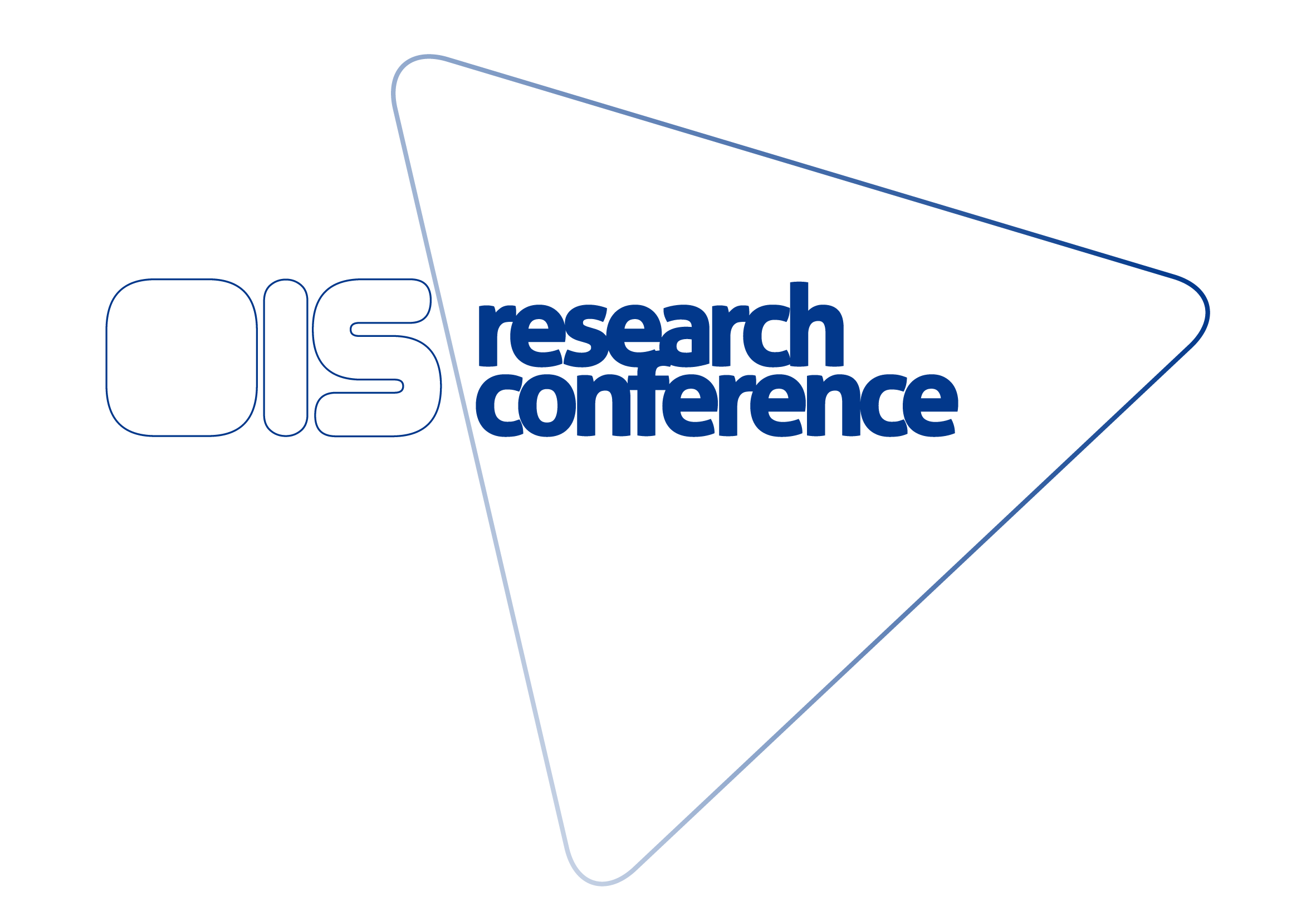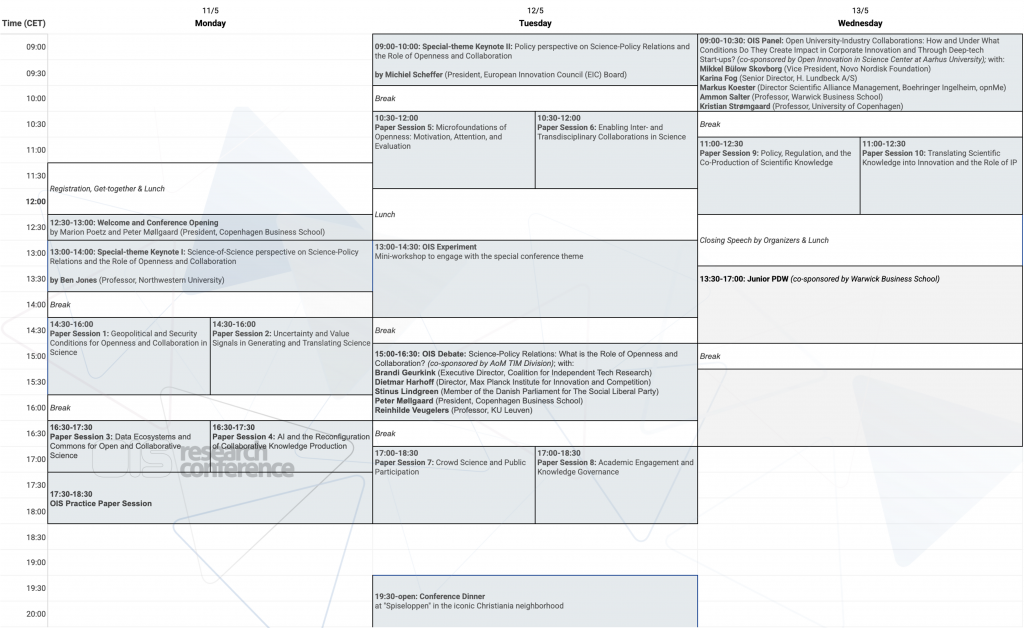OIS Research Conference 2026
11-13 May | Copenhagen Business School, Denmark
We invite you to join the discussion about openness and collaboration in scientific research at the upcoming 7th OIS Research Conference.
OIS research investigates whether, how, and under which conditions open and collaborative practices influence the productivity and societal impact of scientific research. We strive for a balanced view that recognizes important contingency factors on the individual, organizational, and ecosystem-level.
The 2026 special conference theme focuses on Science-Policy Relations: What is the role of openness and collaboration?
Science-based input into policy decisions is more crucial than ever to address complex global challenges such as climate change, digital transformation, and geopolitical instability. Existing channels such as scientific services in national parliaments, one-way consultations, or ad hoc advisory roles help, but they often fall short of providing scientific expertise in ways that are timely, transparent, and attuned to broader societal contexts. Rising mistrust in science adds to the strain. Yet the relationship is not one-way: while science informs policy, policy priorities, incentives, and rules also shape what gets researched, how quickly results are produced, and how evidence is framed.
Openness and collaboration offer promising avenues to reimagine these relationships. Open access to publications, data, and methods can enable broader reuse and engagement, while AI tools may enhance scalability and integration into policy processes. Beyond access, sustained co-development of policies between scientists and policymakers – and at times, with citizens or other stakeholders – may strengthen the relevance, transparency, and legitimacy of outcomes. Yet these models also raise questions about credibility, responsibility, and alignment with democratic processes. Hence, this year’s theme explores science-policy interactions as a two-way, evolving relationship, asking how openness and collaboration can both enable and complicate the pursuit of evidence that is usable, trustworthy, and aligned with democratic values.
► Conference tracks
Track 1: Open and collaborative approaches along the entire scientific research process, including opportunities, challenges, and contingency factors. Possible topics include but are not limited to:
- Crowdfunding/crowdsourcing science and citizen science
- (Open) university-industry collaborations
- Open data/material sharing/re-use
- Platforms facilitating open and collaborative approaches to scientific research
Track 2: Ecosystems and organizational designs facilitating or constraining open and collaborative research approaches. Possible topics include but are not limited to:
- Institutional factors
- Local and national policies
- Intellectual property rights
- Incentive and impact measurement systems
Track 3: Micro-foundations of open and collaborative research approaches. Possible topics include but are not limited to:
- Scientists’ motives for engaging in open and collaborative research
- Skills and capabilities for open and collaborative research
- Attitudes and beliefs supporting or blocking open and collaborative research
- Characteristics and motives of institutional entrepreneurs in research organizations
This year’s special conference theme: Science-Policy Relations: What is the role of openness and collaboration?
The conference enables presentation and discussion of both, early-stage and advanced research projects.
Research presented at the conference must not have been accepted for journal publication.
Registration
Registration is open. Please click on the button below to register.
Submission
The submission system is closed.
Downloads
Blog
Read more about OIS research and previous iterations of the annual OIS Research Conference in our blog.
► Submission
The submission system is closed.
► Registration
Given this year’s venue setup, we are more flexible than in previous years regarding conference participation and are able to welcome attendees also without a paper presentation or other predefined role.
Click here to register for the conference.
► Conference program
In addition to inspirational Paper Sessions on different processes, effects and boundary conditions of open and collaborative science and science-based innovation, the conference program includes plenary sessions related to this year’s conference theme (Science-Policy Relations: What is the role of openness and collaboration?) such as:
- a Keynote speech by Ben Jones (Professor at Northwestern University)
- Special-theme Keynote speech by Michiel Scheffer (President, European Innovation Council (EIC) Board)
- an OIS Debate (co-sponsored by AoM TIM Division) with Brandi Geurkink (Executive Director of the Coalition for Independent Tech Research), Dietmar Harhoff (Director at Max Planck Institute for Innovation and Competition), Stinus Lindgreen (Member of the Danish Parliament for The Social Liberal Party), Peter Møllgaard (President of Copenhagen Business School), and Reinhilde Veugelers (Professor at KU Leuven)
- an OIS Experiment where we “walk the talk“ by engaging in and reflecting on novel ways of doing research
The 2026-conference will feature an additional OIS Panel on open university-industry collaboration with Mikkel Bülow Skovborg (Vice President at The Novo Nordisk Foundation), Karina Fog (Senior Director, H. Lundbeck A/S), Markus Koester (Director Scientific Alliance Management at Boehringer Ingelheim), Ammon Salter (Professor at Warwick Business School), and Kristian Strømgaard (Professor, University of Copenhagen), co-sponsored by the Open Innovation in Science Center at Aarhus University.
The conference also organizes a Junior Paper Development Workshop on May 13 in the afternoon, co-sponsered by Warwick Business School. Junior scholars (PhDs and post-docs) can indicate their interest in participating and receiving personalized in-depth feedback from senior mentors during the abstract submission process.
Program overview (please click on the image to enlarge):
► Practicalities and conference fee
The conference will be an in-person meeting at Copenhagen Business School (Kilen Campus: Kilevej 14A, 2000 Frederiksberg), with online streaming for selected sessions to enable participation for a broader audience. The core conference program will commence on May 11 early afternoon and conclude on May 13 early afternoon (see program overview). We expect participants to attend the entire program.
The conference fee is 250 Euros. PhD students facing financial constraints can pay a reduced fee of 100 Euros upon prior agreement with the conference organizers. The conference fee covers all meals including a fabulous conference dinner at Restaurant Spiseloppen in the free town Christiania.
► Accommodation
We recommend finalizing your accommodation plans as soon as possible. We recommend the following hotels, from which the conference venue can be reached easily and quickly:
- Premium: Scandic Falkoner Hotel
- Medium: Ibsens Hotel
- Budget: Wakeup Borgergade
The 2026 OIS Research Conference is organized by:

The 2026 organizing team:
Susanne Beck (Warwick Business School)
Christoph Grimpe (Copenhagen Business School)
Maria Theresa Norn (Aarhus University & DTU)
Marion Poetz (Copenhagen Business School)
Henry Sauermann (ESMT Berlin)
Astrid Ulv Thomsen (Copenhagen Business School)
Contact
Please contact us for any questions or to be added to our conference mailing list, which will ensure that you receive the latest updates about the annual OIS Research Conference.

